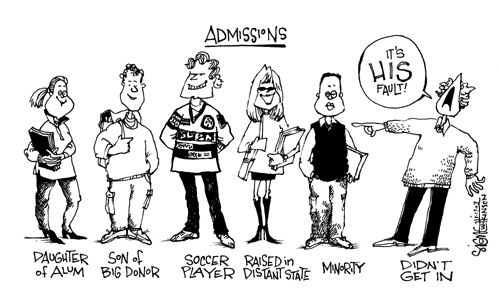Yesterday, the US Court of Appeals’ Fifth Circuit handed down its decision on Fisher vs. University of Texas, a landmark affirmative action case first filed in 2008 by then-undergraduates Abigail Fisher and Rachel Michalewicz (Michalewicz later pulled out of the case), both of whom alleged violation of their rights under the 14th Amendment when they were denied admission to UT Austin.
UT Austin admits 81% of its incoming freshmen under Texas’ “Top 10%” bill, which grants automatic admission to high school students scoring in the top 10% of their graduating class; the remaining admission decisions are based on a holistic review process, which includes consideration of race among many other factors. Fisher argued that her scores — her grades ranked her in the top 12% of her high school class and she scored an 1180 (out of 1600) on her SATs — rendered her highly qualified for the school, and she challenged the school admission board’s use of racial information as unconstitutional.
Yesterday – after the Supreme Court last year kicked the case back down to the lower courts – the Appeals court handed down the final word: yes, UT Austin’s race-conscious holistic review process is constitutional. Abigail Fisher is wrong.
Except, we kind of already knew that.

Since the landmark Bakke Supreme Court decision in 1978 first ruling race-conscious affirmative action to be constitutional, and Grutter v. Bollinger in 2003 which reaffirmed the “narrow” use of race, the question of whether or not race-conscious affirmative action is inherently constitutional is pretty much settled court law. Fisher’s case challenged whether or not UT Austin’s policy met the court’s standards of a “narrow” consideration, and her argument was based largely on the school’s consideration of race at all.
Yet, there was no evidence that UT Austin had established racial quotas, or that the 19% of applicants who were admitted to the school under holistic review were considered with race as a major factor. Indeed, only about 15% of students admitted to UT Austin under holistic review are African American (in a state that is about 12% Black). Consistent with how affirmative action is practiced in college admissions throughout the country, racial background is only one of hundreds of factors collected about an applicant, and is only considered on a case-by-case basis and in a narrow fashion, as part of a larger consideration of the diversity of the school’s incoming freshman.
And why? The US Court of Appeals’ writing is perhaps more significant than their decision. Echoing the arguments first laid out in Bakke and Grutter, the Appeals Court cited the university’s “compelling interest” in advancing campus diversity:
“We are persuaded that to deny U.T. Austin its limited use of race in its search for holistic diversity would hobble the richness of the educational experience in contradiction of the plain teachings of Bakke and Grutter,” Judge Patrick E. Higginbotham wrote, referring to two previous affirmative-action rulings by the Supreme Court.”
Later, the justices wrote (emphasis mine):
It is equally settled that universities may use race as part of a holistic admissions program where it cannot otherwise achieve diversity…This interest is compelled by the reality that university education is more the shaping of lives than the filling of heads with facts — the classic assertion of the humanities.”
Indeed. Most would argue that the goal of university is the straightforward communication of facts from teacher to student and that the make-up of a student’s fellow classmates is meaningless to that process. If that were indeed the case, than why do we still send kids to campuses of higher learning? If the campus environment is unimportant to your child’s college education, why not enroll your son or daughter in distance learning programs? Many schools — including the nation’s top private institutions of higher learning — offer online degree programs; if it doesn’t matter whom your kid is sitting next to in their classroom, then why not let them pursue their Harvard degree from the comfort of their bedroom?

Of course, most parents would not pursue distance learning for their children because as much as we argue that the classroom experience doesn’t matter, we know that it does. We understand that what our sons and daughters learn through immersion in a rich, dynamic — and diverse — on-campus environment is as important to our child’s education as what the lecturer is saying. We intuitively understand that the goal of a university education is more than just pouring facts into willing and eager young brains. We see the studies showing the value of campus diversity to student learning, and we hear the testimonies from international companies who favour job candidates who receive degrees on diverse campuses, and who are more prepared for a globalized marketplace.
“This ruling ensures that our campus, our state and the entire nation will benefit from the exchange of ideas and thoughts that happens when students who are diverse in all regards come together in the classroom, at campus events and in all aspects of campus life,” he said.
The mission of public universities is not identical to that of a judge at a track-and-field event — to identify and reward competitors with the most effort and skill with a gold medal of a college degree; or more specifically, that is not their only mission. As discussed in my podcast on Monday with Snoopy Jenkins (@SnoopyJenkins) on affirmative action, post-secondary education is as much a matter of public policy as it is a carrot for teenaged hard work. The compelling interest of the admissions officer at a public university is not just to reward the best candidates (whatever that means); it is to build the best learning environment, which will in turn produce the brightest and most competitive young workers to help grow the state economy.
Public education as a matter of public policy is not a new idea. Broad investments in an educated workforce pays dividends in promoting economic growth, class mobility, and even greater political participation. Any system that would institutionalize the exclusion of some sects of the population — by race, by class, or by gender — is not just amoral, it is damaging to our economic future by limiting the degree to which some populations can access mechanisms of upward mobility and wealth creation.
Race-conscious affirmative action policies, like class- and gender-conscious affirmative action policies, justify their existence through the historic recognition that institutions of higher educations have excluded people of many backgrounds — Blacks, Latinos, Asians, women, and the poor among others — which reinforces income and achievement gaps by building a near-permanent underclass. We fool ourselves into thinking the game isn’t rigged against candidates coming from those backgrounds, even though a plethora of data prove otherwise; instead, we expect disadvantaged candidates to be superhuman just to find themselves judged as “just as good”. And when they actually do prove themselves qualified — as 16% of African American candidates admitted to UT Austin did when they received an admissions offer during Fisher’s application year — we cry (reverse) racism.
Abigail Fisher forgot — as many privileged college applicants who are never forced to consider their skin privilege do — that college admission is not a guarantee. College admissions is not like buying a car, where you show up at the dealership with down-payment in hand and demand your new car to which you feel entitled.

Instead, college admissions is more like speed-dating. Like speed-dating, both students and colleges court one another by putting their best foot forward. Like speed dating, the stakes are high: a long-term relationship will be forged out of this decision, so neither party can afford to take it lightly. Like speed dating, all either party can really do to prepare is make a good first impression. Like speed dating, what some will find attractive is not the same as what others will find attractive. Like speed dating, everyone is invested in learning as much about the other party as possible.
And finally, like speed dating, no one is guaranteed a budding romantic relationship at the end of the night, no matter how good a candidate for marriage they might seem to be on paper. Arguing against holistic review in college admissions is like arguing for a speed-dating event where daters blindly make dating choices based only on the annual income of their prospective partner. Would you want to commit to dating a person based only on the fact that they make $80,000 a year? I thought not. So why ask colleges to work that way?
It’s human to feel cheated when you are rejected by a college admissions board, just as it is human to feel cheated when you are rejected by the prospective romantic partner you really had your eye on at a speed-dating session. Abigail Fisher felt like the system was unfair when UT Austin jilted her; but that doesn’t actually make it so.
Maybe UT Austin just wasn’t all that into her.


